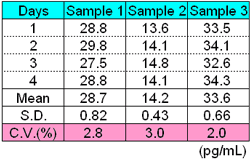Kainos


国别:日本Kainos
The FGF-23 ELISA Kit is a two-site enzyme-linked immunosorbent assay kit for the measurement of FGF-23 in serum. Two specific murine monoclonal antibodies bind to full-length FGF-23. One antibody is immobilized onto the microtiter plate well for capture. The other antibody is conjugated to HRP(horseradish peroxidase) for detection.
In first reaction, a sample containing FGF-23 is incubated with the immobilized antibody in a microtiter well. FGF-23 in the sample is captured with the antibody. At the end of this reaction, the well is washed to remove unbound FGF-23 and other components.
In second reaction, this immobilized FGF-23 is incubated with HRP labeled antibody to form a “sandwich”complex :
Anti FGF-23 antibody - N-terminal FGF-23 C-terminal - HRP labeled anti FGF-23 antibody
At the end of this reaction, the well is washed to remove unbound components.
In enzyme reaction, the sandwich complex immobilized on the well is incubated with a substrate solution and then measured by a spectrophotometric microtiter plate reader. The enzymatic activity of the complex bound to the well is directly proportional to the amount of FGF-23 in the sample.
A standard curve is generated by plotting the absorbance versus the each concentration of FGF-23 standard. The concentration of FGF-23 in the sample is determined from this curve.
This kit captures ADAMTS13-cleaved products using a sandwich method with the anti-GST mouse monoclonal antibody and the peroxidase-conjugated mouse monoclonal anti-N10 antibody. First, the anti-GST mouse monoclonal antibody immobilized on to the microplate reacts with the VWF73 substrate(GST-VWF73-His). The sample is then applied to the microplate, on which ADAMTS13 cleaves the VWF73 substrate. By applying the mouse monoclonal anti-N10 antibody conjugated with horseradish peroxidase(HRP conjugated antibody), the cleavage product is sandwiched between the two antibodies. Because the amount of the cleavage products depends on the ADAMTS13 activity, the amount of the enzyme-labeled antibodies that bind to the cleavage products also reflect the level of ADAMTS13 activity. Therefore, the plasma ADAMTS13 activity can be determined by colorimetrically measuring the amount of detached oxidized (colored)TMBZ using urea hydrogen peroxide(H2O2)and 3,3’,5,5’-Tetramethyl- benzidine(TMBZ)as the substrates.

Kainos
Aqua-auto Kainos UN-II Test Kit
While the Urease-GLDH method is most widely used for measuring urea nitrogen with its high sensitivity and specificity, this method suffers from possible erroneous results because of presence of ammonium that may be generated with bacterial contamination.
Kainos’ newly developed Aqua-auto Kainos UN-II Test Kit that uses isocitric acid dehydrogenase (ICDH) to dramatically improve the coping capacity to ammonium in the sample is a liquid form urea nitrogen measurement reagent kit with superior manipulability and linearity for various automatic analyzer systems.

Kainos
Aqua-auto Kainos CRE-II Test Kit
Serum creatinine level is an index of high diagnostic value that increases with impaired renal functions such as those caused by kidney failure or uremia.
Kainos' newly developed Aqua-auto Kainos CRE-II Test Kit that is based on enzymes with excellent heat stability along with proprietary technology in the added stabilizer and dye is an easy-to-use liquid form creatinine measurement reagent kit for various makes of automatic analyzer systems.

Kainos
Aqua-auto Kainos ALB Test Kit
The Bromocresol Green (BCG) method commonly used for colorimetric determination of albumin suffers from the disadvantage that it also reacts with the globulin fraction.
Kainos’ new Aqua-auto Kainos ALB Test Kit is a liquid form reagent kit based on the Bromocresol Purple (BCP) method that has a superior specificity to albumin compared to the traditional BCG method, solving the issue of different reactivities that BCP exhibits toward nonmercaptalbumin (HNA, oxidized form) and mercaptalbumin (HMA, reduced form).

Kainos
POCT refers to tests that are performed in close proximity to patients including those tests performed in hospital ICUs, emergency treatment rooms, hospital wards or clinical practices including offices of practicing doctors as well as patient-performed tests such as the blood glucose monitoring tests. Because they can quickly provide results which doctors can immediately use to choose appropriate remedies, they are now widely used in various situations including diagnosis of influenza viruses and pregnancy.
“Swiftgene Norovirus GI/GIIKainos” for detecting noroviruses
This product qualitatively detects norovirus genes extracted from fecal or other samples through a NASBA nucleic acid amplification technology combined with a nucleic acid chromatography.

Kainos
“StatmarkTM FLUstick-N” for detecting Type A and Type B influenza virus antigens
This product detects the Type A and/or Type B antigens to influenza viruses in nasal wipe or discharge samples using an immunochromatographic technique.

Kainos
“StatmarkTM Strep A” for detecting Group A beta-hemolytic streptococci
This product qualitatively detects Group A beta-hemolytic streptococci in pharyngeal wipe samples using an immunochromatographic technique.

Kainos
PRINCIPLE OF THE ASSAY Kainos
The FGF-23 ELISA Kit is a two-site enzyme-linked immunosorbent assay kit for the measurement of FGF-23 in serum. Two specific murine monoclonal antibodies bind to full-length FGF-23. One antibody is immobilized onto the microtiter plate well for capture. The other antibody is conjugated to HRP(horseradish peroxidase) for detection.
In first reaction, a sample containing FGF-23 is incubated with the immobilized antibody in a microtiter well. FGF-23 in the sample is captured with the antibody. At the end of this reaction, the well is washed to remove unbound FGF-23 and other components.
In second reaction, this immobilized FGF-23 is incubated with HRP labeled antibody to form a “sandwich”complex :
Anti FGF-23 antibody - N-terminal FGF-23 C-terminal - HRP labeled anti FGF-23 antibody Kainos
At the end of this reaction, the well is washed to remove unbound components.
In enzyme reaction, the sandwich complex immobilized on the well is incubated with a substrate solution and then measured by a spectrophotometric microtiter plate reader. The enzymatic activity of the complex bound to the well is directly proportional to the amount of FGF-23 in the sample.
A standard curve is generated by plotting the absorbance versus the each concentration of FGF-23 standard. The concentration of FGF-23 in the sample is determined from this curve.
Q&A
A.Product information
1) Number of tests included in / price of the FGF-23 ELISA kit
|
Product Name
|
Cat.#
|
# Tests
|
Price
|
|
FGF-23 ELISA Kit
|
CY-4000
|
96 tests
|
100,000 JPY
|
Note: The price does not include shipping & handling fees
2) FGF-23 ELISA Kit specification
This kit measures the level of serum FGF-23 using a “sandwich” ELISA with an anti-human FGF-23 mouse monoclonal antibody. The kit has a high sensitivity with the minimum detection limit of 3 pg/mL as well as a wide quantification range of 3-800 pg/mL.
B. Purchase method and delivery
1) How can I purchase the FGF-23 ELISA kit?
Please use our online shop to purchase the FGF-23 ELISA kit. Only credit cards (VISA or MasterCard) are accepted for payment.
ON LINE SHOP
2) Custom broker
Please enter the name of your custom broker in the webpage that appears after ordering the product. If no name is entered, we will use Nippon Express.
In this case, a local Nippon Express agent will contact you to arrange the delivery.
3) Delivery
The shipping and handling fees will be borne by the consignee. Your custom broker (or Nippon Express if you do not specify the broker) will bill you for the accrued amount. Please contact the custom broker for details.
Package size
The package sizes for the FGF-23 ELISA kit will be:
|
Qty
|
Package Size (LxWxH)
|
Approx. Weight
|
|
1 Kit
|
28x37x29 cm
|
6.0 kg
|
|
2 Kits
|
28x37x29 cm
|
6.5 kg
|
|
3 Kits
|
35x42x30 cm
|
7.5 kg
|
|
4 Kits
|
35x42x30 cm
|
8.0 kg
|
|
5 Kits
|
35x42x30 cm
|
9.0 kg
|
|
10 Kits
|
37x66x32 cm
|
15.0 kg
|
C. Precaution for use
1) What is the storage condition for test samples?
Use the freshest available serum samples. If you cannot immediately test your samples, store them below -70°C. Avoid thaw/refreeze cycles.
In our lab tests, the activity of a given sample decreases to 86.6% after 13 days in the refrigerator. Samples may remain stable for about three years at -80°C but at -20°C the stability cannot be guaranteed.
We have confirmed up to six thaw/refreeze cycles may not affect the activity, but we recommend freezing your samples in small batches to minimize the thaw/refreeze cycles.
2) Can I use plasma samples?
While both plasma and serum may be tested using the FGF-23 ELISA kit, we recommend using serum.
3) Can I use the kit to test animal samples?
The FGF-23 ELISA kit may be used to measure mouse, rat or monkey blood FGF-23 levels.
4) Does the kit contain any mercury-based preservatives?
The FGF-23 ELISA kit does not use mercury-based preservatives such as thimerosal. The standard solution, diluting solution, enzyme labeled antibody solution and concentrated washing solution use Kathon™ CG as the preservative.
5) Operational precautions
Calibration curve must be prepared for each test run.
If multiple samples are tested, the reaction times must be kept uniform.
The first-order reaction must be carried out while stirring the plate. The plate should be sealed before stirring.
The following precautions must be observed in the washing cycles:
Do not leave plates with washing solution in them.
Once sufficiently removing the washing solution from the wells, immediately proceed to the next step.
To Top Page
REAGENTS Kainos
1) FGF-23 Antibody coated Microplate(FGF-23 Microplate)
96 well microplate(12 strips of 8 well)coated with a murine monoclonal antibody against FGF-23.
2) HRP labeled FGF-23 Antibody(FGF-23 Conjugate)
12 mL of murine monoclonal antibody against FGF-23 conjugated to horseradish peroxidase, with preservatives.
This reagent should be stored at 2-10℃ and protected from light.
3) FGF-23 Standards(Std1~Std7)
12 mL (Std1) and 0.5 mL(Std2~Std7) of buffered FGF-23 with preservative.
7 vials of FGF-23 in buffered base with preservative.
4) Assay Diluent(Assay Diluent)
12 mL of buffer.
5) Color Reagent(Substrate)
12 mL of tetramethylbenzidineTMBZ)with urea hydrogen peroxide.
6) FGF-23 Wash Buffer(10×Concentrate)
53 mL of 10-fold concentrated solution of buffered surfactant with preservative.
Before using, dilute the contents to 10-fold with deionized water and mix well.
7) Stop Solution(Stop Solution)
12 mL of 0.5 mol/L-Sulfuric acid.
8) Plate Sealer
Three included in kit.
*These reagents should be stored at 2-10 ℃ in dark.
Before using bring all reagents to room temperature.
To Top Page
Assay Method Kainos
1) Add 50 μL of Assay Diluent into all wells to be used.
2) Add 50 μL of FGF-23 Standards or sample into each well, and cover the plate with a plate sealer.
3) Incubate plate at room temperature for 120 minutes on a plate mixer.
4) Remove the plate sealer.
After removing the reaction solution, add 300 μL of Wash Buffer Solution into each well and then discard the Wash Buffer Solution.
Repeat this process 4 times. Remove any droplets remaining in the wells by tapping the plate on paper towel or similar absorbent material.
[Note 1]
In order to avoid wells from drying out when adding Wash Buffer Solution, work quickly with a multi-channel pipette or a similar device.
[Note 2]
Make sure the pipette tips do not scratch the well bottoms trying to remove the solution from the well.
5) Add 100 μL of FGF-23 Conjugate into each well and cover the plate with a plate sealer.
Incubate plate at room temperature for 60 minutes on a plate mixer.
6) Repeat in the same manner 4).
7) Add 100 μL of Substrate into each well and cover the plate with a plate sealer.
Incubate plate at room temperature for 30 minutes in dark.
8) Remove plate sealer.
Immediately add 100 μL of Stop Solution into each well.
Read the absorbance at 450 nm (secondary wavelength 600-650 nm) within 10 minutes by microtiter plate reader.
Add 50 μL of Assay Diluent.
Add 50 μL of FGF-23 Standards or samples.
Incubate at room temperature for 120 minutes on a plate mixer.
Aspirate and wash 4 times.
Add 100 μL of FGF-23 Conjugate.
Incubate at room temperature for 60minutes on a plate mixer.
Aspirate and wash 4 times.
Add 100 μL of Substrate into each well.
Incubate at room temperature for 30 minutes in dark.
Add 100 μL of Stop Solution.
Read the absorbance within 10 minutes.
To Top Page
PERFORMANCE
Callibration curve
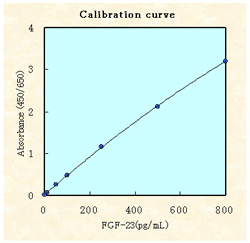
Linearity (Human serum)
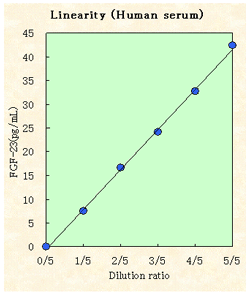
Sensitivity
(n=8, mean±2 S.D.
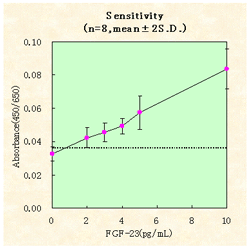
INTER-ASSAY
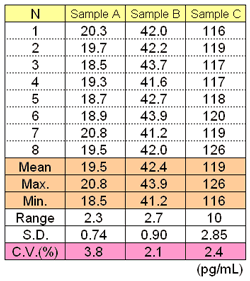
INTRA-ASSAY
